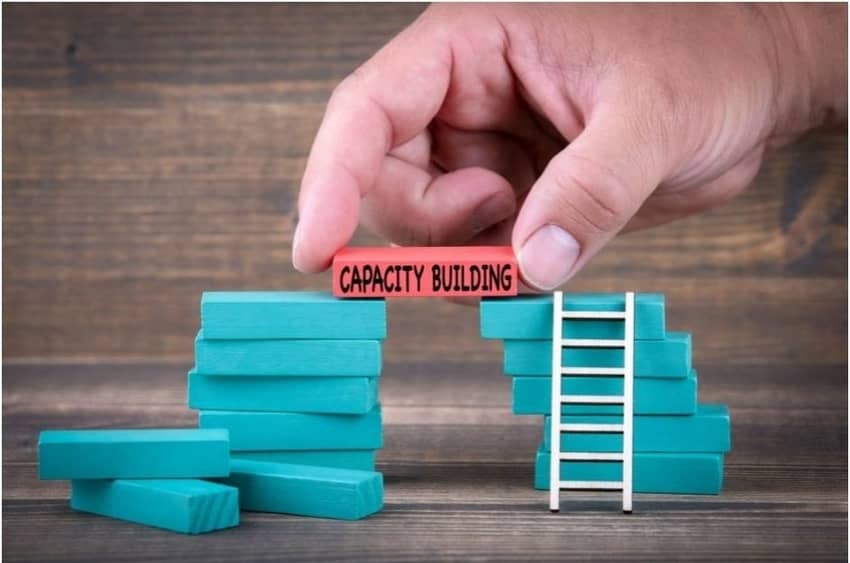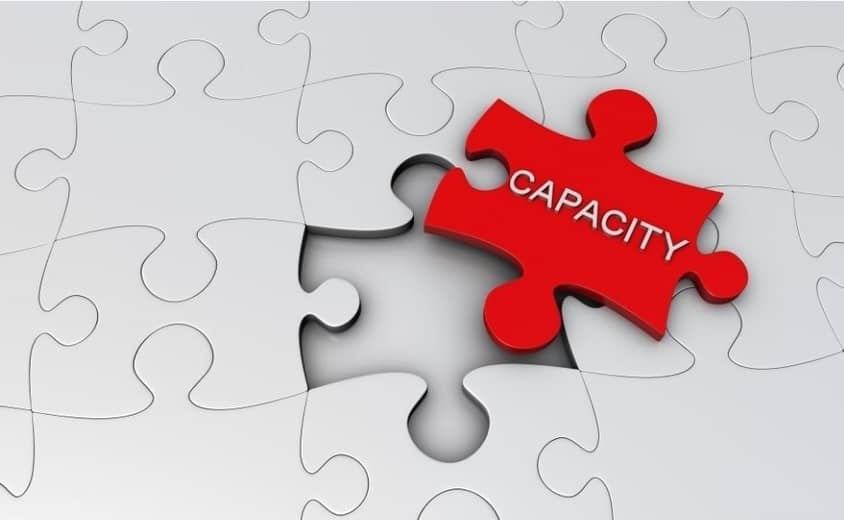Everyone knows that divorce is stressful. Tips for managing divorce stress typically include things like taking up yoga, meditation, exercise, or going to therapy. While all of those techniques can be helpful, if you really want to manage your stress and have a more successful divorce, you have to address what really lies at the heart of that stress: your emotional capacity.
What is Emotional Capacity?
The term “capacity” has a variety of definitions. The two most relevant to this discussion are:
… the maximum amount …. that can be received or contained;
and
… the actual or potential ability to perform, yield, or withstand …
In other words, “capacity” is the maximum amount you can do, hold, or withstand at any given time. It is your emotional bandwidth.
When you’ve reached your “emotional capacity,” you’re at your limit. You can’t do more. You can’t handle one more thing.
Your Emotional Capacity Affects Your Divorce Experience
In the context of divorce, your “emotional capacity” relates to the maximum amount of emotional “stuff” you can deal with at any given time. That “stuff” includes the emotions you experience while you’re going through your divorce.
The problem is that almost everything related to divorce is emotional.
Reconciling yourself to the fact that your marriage is over is emotional. Finding a new home is emotional. Losing your identity is emotional. Managing finances that are stretched beyond their limits because of your divorce is emotional. So is comforting your kids and trying to get them adjust to a “new normal.”
All these typical divorce-related events are emotional. They all place demands on your emotional capacity. And they all hit you at the same time. Unless you learn how to manage those emotions properly, you hit a wall. You start to break down.
That’s the real problem.
When you’ve hit your emotional coping limit you stop being able to think clearly. Your ability to make decisions suffers. Your ability to focus, or get anything done, suffers. And your patience goes right out the window.
Like a computer that has reached its bandwidth limit, when you’ve reached your emotional limit, you start to slow down. If you keep pushing anyway, eventually you break down.
That’s when your divorce gets really painful.

You Can’t Handle More than You Can Handle
Most people think that getting too emotionally stressed out will make you sick or give you a nervous breakdown. While both of those things can happen, a lot of less dramatic – but equally bad -- things typically happen before then.
Paying attention to the more subtle signs that you’re at the limit of your capacity will keep you from going totally over the edge.
For example, if you’re constantly anxious and you find yourself snapping at your kids for doing the slightest thing wrong, you’ve probably reached your emotional limit.
If you’re normally a productive person but now you find yourself going in circles and you can’t seem to get anything done, chances are you’re at your emotional limit. The same thing is true if you find that you totally lack energy, you can’t concentrate, or you’re depressed all the time.
Recognizing when you’re at your limit and taking the time to do something about it is critical to getting the best outcome in your divorce.
That’s because when you push yourself beyond your emotional limits you lose your ability to think clearly. That means that the decisions you make while you’re in that state are not likely to be your best decisions.
Bad decisions create bad outcomes.
Pushing beyond your limits also tends to make you more irritable with your spouse. The more irritable you are, the more you and your spouse will fight. Fighting more makes your divorce more miserable.
Finally, pushing beyond your capacity can also stress your relationship with your kids. You’ll have less empathy for their situation and their pain. Or you’ll start leaning on them for emotional support.
None of those behaviors is good for your kids.
Respecting Your Spouse’s Capacity
Another factor that directly affects your divorce experience is your spouse’s emotional capacity.
Everyone’s emotional capacity is different. That’s true whether you’re going through a divorce or not.
Some people can change jobs, move their house, deal with aging parents, and manage a critical illness all at the same time. They have a lot of emotional capacity.
Others get stressed out when dealing with just one of those major life events. Their emotional bandwidth is much lower.
Even if you can handle A LOT, if your spouse doesn’t have the same capacity that you have, you’re going to have to take things slower. If you push too hard, your spouse will either dig in, fight back, or shut down. None of those behaviors makes for an amicable divorce.
The bottom line is that if you want to get through your divorce in the least painful, and most productive way, you MUST respect everyone’s capacity.
How Big is Your Capacity?
While the size of your emotional capacity matters, it’s not what matters most.
That’s because your “capacity,” your ability to deal with life’s ups and downs, isn’t set in stone. It fluctuates.
Sometimes you can cope with a lot. Other times you can’t.
More importantly, just like you can add bandwidth to your internet connection, you can also add emotional bandwidth to yourself.
You can increase your emotional capacity – even during a divorce.

9 Tips for Expanding Your Emotional Capacity
1. When you’re at your limit – Stop!
Everyone has limits. When you’ve hit the limit of what you can handle in any given day it’s time to take a break. Continuing to work when you’re physically, mentally, or emotionally exhausted will only wreck you. It will wear you down and make you less productive for a longer period of time.
Plus, when you continue to push forward through your exhaustion, you make mistakes. You make bad decisions. You lose your temper. Later, you’ll have to spend more time cleaning up the mess you made (if you even can!) than you would have spent if you just took a break and started again when you had a clearer head.
2. Get some sleep.
Sleep deprivation affects your ability to think, to concentrate and to remember things. It puts you at risk for diabetes, high blood pressure and heart disease. It also can affect your mood.
Not being able to sleep comes with the territory in divorce. In small doses, you can deal with some insomnia. But if you’re so stressed that you can’t sleep for days, weeks, or more, you may want to consider seeing a physician and getting a prescription that can help you sleep.
3. Learn to say “No”
Going through a divorce is like having a second full-time job. If your life was already full before your divorce, chances are it’s now overflowing. That means you need to start downsizing your schedule.
Take a long hard look at all of your commitments. What activities can you let go of for now? What are you saying “yes” to that you’d rather say “no” to? Is there anything you can stop doing, at least while you’re going through your divorce? Be brutally honest with yourself. Then take a deep breath and stop doing the things you no longer have the time or capacity to do.

4. Get a Therapist
If you want to expand your emotional capacity, you’ve got to deal with the emotions that come up during your divorce so that you can make room to handle more. Getting a good therapist is essential to doing that.
Talking to y7. our friends and family is great. But they’re probably going to get sick of listening to you long before you’re sick of talking about your divorce. What’s more, friends and family won’t help you process your emotions. Often they’ll just agree with your point of view and encourage you to keep feeling whatever you’re feeling. While that will make you feel loved and supported, it won’t help you manage your emotions or expand your capacity to deal with them.
5. Simplify Your Life
Emotional overload can cause a condition called decision fatigue. To avoid decision fatigue and expand your ability to make good decisions, try to simplify your life and systematize routine decisions.
For example, buy food that’s easy to cook, or order take out. Make lunches for your kids the day before they need them. Plan your daily work schedule at least 24 hours in advance. Find ways to carpool to get your kids to their activities. Do whatever you can to reduce and systematize your daily “to do” list so that you free up more time for yourself.
6. Take Care of Yourself
A little self-care goes a long way. It’s all too easy when you’re going through a divorce to think you don’t have the time or the money to indulge in things that make you feel good. But purposely doing things that feel good can boost your mood – and your emotional capacity! What you do doesn’t have to be time-consuming or expensive.
For example, you could splurge on a manicure or have a beer with friends. You could put the kids to bed early one night so that you can take a warm bath, catch up on your favorite TV show, or read a book. Do something at least once (maybe twice!) a week that you enjoy.

7. Exercise
Regular exercise will boost your energy, improve your mood and help you sleep better. It is a phenomenal stress reliever and a great way to work your emotions out of your body.
The kind of exercise you choose to do doesn’t matter. What matters is that you move. Exercising on a regular basis – even for a short amount of time – will help clear your head and increase your coping ability.
8. Set and Respect Your Boundaries
When you and your spouse are in the process of un-coupling your boundaries will change. You may no longer be comfortable sleeping in the same room, or living in the same house, as your spouse. You may want to go out more with friends or start to work out. But when you start to pull away you may find that your spouse starts to hang on.
That’s why setting your boundaries – clearly and respectfully --- is important. You need to TELL your spouse what you want and don’t want. If your spouse crosses a line and starts to disrespect your boundaries, you need to learn to say no and enforce your boundaries. While doing that will likely feel awkward at first, once your boundaries are firmly in place you will free up a lot of mental and emotional bandwidth that you may not have even realized you had.
9. Learn to Let Go
Nothing will keep you in a twist longer than stewing over something that you can’t control. Like it or not, divorce is FULL of things you can’t control. You can’t control your ex, your lawyer, your spouse’s lawyer, the judge or even the divorce process. Instead of raging about how the system is unfair or your spouse is a jerk, consciously decide not to stress over what you can’t control.
Is letting go easy? Of course not! That’s why getting a good therapist is so important. S/he can help you process your emotions so that you CAN let them go. But letting go starts with a decision. It starts when you decide that you won’t allow something outside of you control what’s inside of you. Once you do that, not only will your emotional bandwidth increase, but your divorce will also become way easier to deal with.

The Bottom Line
Expanding your emotional capacity isn’t something most people normally think about when they’re going through a divorce. Yet, divorce WILL stretch your boundaries. It WILL stretch your capacity … one way or another.
As you go through your divorce you will find that the things that sent you into a tailspin in the beginning of your divorce no longer even phase you by the end of your divorce. In time, your ability to handle the curve balls that divorce will inevitably throw at you will expand far beyond what you once thought you can handle.
That’s a good thing. It’s not an easy thing to accomplish. But once you have, you’ll appreciate your new capabilities.
Does expanding your emotional capacity mean that life from that point on life will be full of sunshine and kittens?
No. It’d be awesome if that were true.
But we all know that’s not how life works.
On the other hand, being able to handle more will help make your life (and your divorce!) a little better. YOU will be better. And better is better.


Thank you for the article it was very eye opening and gave me a better understanding of what I need to work on .
You’re welcome!